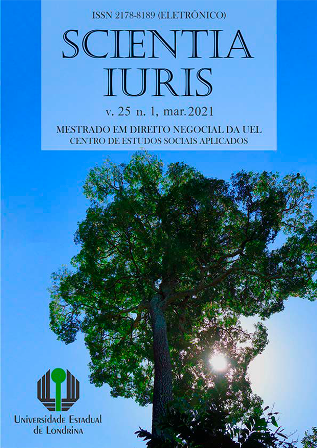The peripheral city and theoretical influences of Brazilian's new school of urbanism
DOI:
https://doi.org/10.5433/2178-8189.2021v25n1p200Keywords:
Urban Policy, Peripheral City, New School of UrbanismAbstract
It aims to present the theoretical influences of the so-called "New School of Urbanism" responsible for providing new academic approaches on the urban issue in Brazil from the perspective of the peripheral city. The two theoretical matrices that served as influence for the movement are presented: French Marxists and Brazilian social interpreters, with emphasis on Celso Furtado and Francisco de Oliveira. It starts from the balance made by Ermínia Maricato in a chapter called "Formation and Impasse Of Critical Thinking About The Peripheral City", which integrates a book of her authorship with the title "The impasse of urban politics" where the author evaluates "cycle" of struggles and conquests in the social, political and academic fields that began during the military dictatorship, but which, after the creation of the Ministries of Cities, in 2003, announced the moment of "the end of the cycle".Downloads
Download data is not yet available.
References
MARICATO, Ermínia. Formação e impasse do pensamento crítico sobre a cidade periférica Em: O impasse da política urbana no Brasil. Petrópolis, RJ: Vozes, 2011.
Downloads
Published
2021-03-31
How to Cite
Santos, R. C. N. dos. (2021). The peripheral city and theoretical influences of Brazilian’s new school of urbanism. Scientia Iuris, 25(1), 200–202. https://doi.org/10.5433/2178-8189.2021v25n1p200
Issue
Section
Resenhas
License
Copyright (c) 2021 Scientia Iuris

This work is licensed under a Creative Commons Attribution 4.0 International License.
The journal reserves the right to modify, in the original text of the submitted article, normative, spelling and grammatical mistakes in order to maintain the cultured standard of language and the credibility of the journal. The journal will respect the authors' writing style. Changes, corrections or suggestions of conceptual order will be sent to the authors, when necessary. In such cases, the articles will be re-examined. The final exams will not be sent to the authors. The published works become the property of the journal, in other words, its total or partial reprinting is subject to the express authorization of the journal. In all subsequent citations, the original source of publication shall be cited and in the case of Photographic Speeches, shall be approved by the original author. The opinions expressed by the authors of the journal's articles are of their sole responsibility.

















